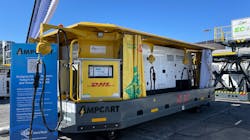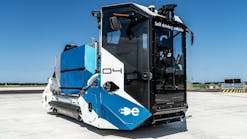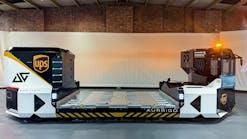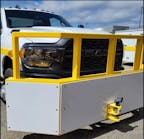Speaking at the 2023 International GSE Expo, held in Las Vegas, Nevada, Oshkosh representatives discussed their recent acquisition of JBT’s AeroTech business – valued at $800 million.
David Burdakin, president, AeroTech Division, and James Johnson, executive vice president and president, vocational, of Oshkosh, highlighted the key aspects and benefits of the deal.
“This is the culmination of a strategy JBT announced 18 months ago, and that was JBT wanted to separate the ownership of the food equipment side of JBT and the AeroTech side of JBT. We felt both businesses would be better off with dedicated leadership. And that’s what we found,” said Burdakin.
Synergy in Culture and Products
Johnson said the acquisition made sense in a number of ways for Oshkosh. Key was a similarity in product focus and philosophy – manufacturing reliable airfield equipment for critical operations.
“This stuff has to work,” said Burdakin. “Whether, in Oshkosh’s case, it’s fire and rescue vehicles or in our case, deicer trucks – eitherway, high reliability is tantamount.”
That reliability is extending to the supply chain, as well. Since each manufacture similar equipment, Oshkosh’s “buying clout” has increased AeroTech’s access to the key items.
“Our buying clout just went up five times compared to what it was as just AeroTech, so that makes large suppliers more interested and opens up the door to new suppliers,” said Burdakin.
The synergies extend beyond merely the physical, as Burdakin elaborated, with JBT and Oshkosh sharing similar values and workplace culture.
“The most important thing is the culture, very similar values,” he said. “People-oriented. One of the key Oshkosh values is people first and that’s a great foundation and culture. We’re already experiencing that benefit.”
Autonomous, Smart Technology
The two also share common research and development interests – namely in electrification/ sustainability, automation and telematics/ digital technology.
One example is the recently unveiled AmpCart, a towable charging station.
“The biggest hurdle for airports and airlines in converting to electric from diesel is the lack of charging infrastructure. This was designed to help with that. It’s a mobile cart designed to provide electric power to parts of the airport that don’t have that infrastructure,” said Burdakin.
For the autonomous side, Burdakin noted JetDock – an automated boarding bridge docking system.
“It’s basically operator-assist,” said Burdakin. “When the plane pulls into the gate and the boarding bridge takes awhile to get to the plane, we now have built in operator assist to help them steer the bridge to the door without having to have significant experience or skill level, replacing a joystick with a push button. This allows for faster turns and less fuel burn.”
Sustainability
Heavily highlighted by Oshkosh was the need to electrify and work towards sustainability. Burdakin said it’s a “very important” goal for them to achieve.
“Not only is it the right thing to do, but it’s also something our customers need,” he said.
Johnson noted that electrification is something Oshkosh has already been working towards, with electric equipment both on order and already in use in multiple markets.
“Recently, we announced a purchase order from Republic Services for 15 of our electric refuse collection vehicles [McNeilus Volterra ZSL],” he said. “We received a purchase order from Air Services Australia and from Dallas Fort Worth for the first electric ARFF vehicles [Striker Volterra 6x6]. We already have electric firetrucks in service in North America.
“So sustainability, electrification is something Oshkosh Corporation has been working on for over a decade.”
One hurdle facing their electrification goals is the supply chain, which Johnson described as good and bad.
“With electric products, there are less moving parts, so in theory you have less suppliers to deal with. However, batteries are the long pole in the tent. A reliable source of batteries for heavy trucks and equipment is a challenge. It’s the biggest challenge facing everyone right now.”
Burdakin added that it has taken longer to upgrade their electric offerings and introduce more electric products due to the supply chain issues.
A Future of Growth
With the aviation industry now largely returning to pre-pandemic levels, Oshkosh sees nothing but growth as they move into the future and are readying to meet the demand.
“We’re interested in global growth and certainly have opportunity to continue to grow in North America, but we’re looking globally to grow,” said Burdakin.
He said that the North American airlines recovered the quickest post-pandemic, and right now Europe and Asia are coming back with their airlines spending capital.
“We’re looking at growth not just through new products and technology, but potentially through acquisition, as well, down the road,” he continued.
Johnson added that, as a global company, Oshkosh will provide AeroTech with worldwide resources they lacked before.
“With 17,000 team members worldwide, whether it’s leveraging supply chain, distribution, or offices, warehouses, etc. this will give an opportunity for AeroTech to accelerate global growth,” said Johnson.






